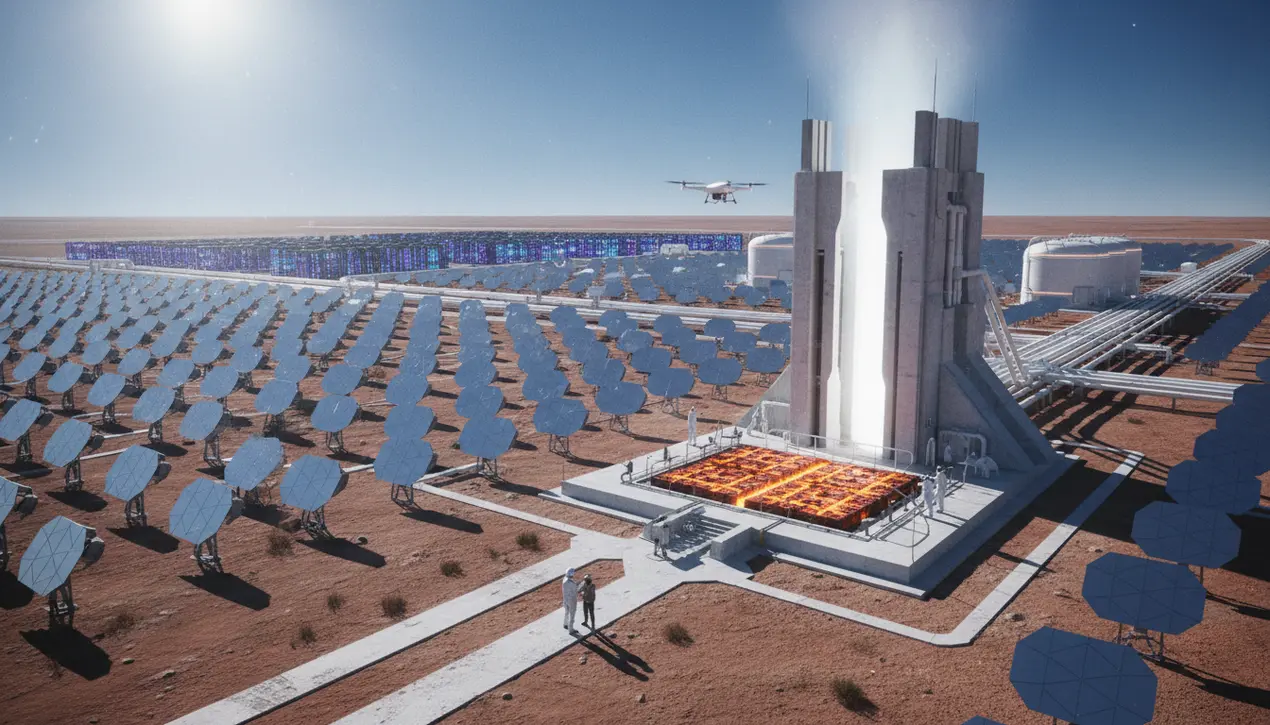
AIchips & hardwareAI Data Centers
Exowatt Aims to Power AI with Hot Rocks and Solar.
TH
Thomas Green
18 hours ago7 min read3 comments
In the high-stakes arena of powering our increasingly data-hungry world, a new contender has entered the ring with a deceptively simple yet profoundly ambitious proposition. Exowatt, a solar-thermal startup, isn't just tweaking the existing energy playbook; it's attempting to rewrite it from the ground up, aiming to deliver electricity for the once-unthinkable price of one cent per kilowatt-hour.The core of their technology is a beautiful synergy of the ancient and the ultramodern: they use modular solar concentrators to superheat a bed of rocks or ceramic blocks to temperatures exceeding 1,800 degrees Fahrenheit. This isn't about creating steam in the moment; it's about building a thermal battery, a literal bank of stored heat energy.This energy can then be dispatched on demand, day or night, by transferring the intense heat to a power-generating engine, effectively turning the sun’s intermittent rays into a firm, dispatchable power source, much like a nuclear or gas plant but without the emissions or fuel costs. The implications for the energy-intensive world of artificial intelligence are staggering.The computational demands of training and running massive large language models and AI clusters are growing at an exponential rate, threatening to outpace the grid's capacity and making energy cost a primary bottleneck for innovation. Data centers, the physical brains of the AI revolution, are voracious consumers of power, and their location is increasingly dictated by the availability of cheap, reliable electricity.Exowatt’s model, if successful, could decouple AI growth from the traditional grid, allowing for the deployment of AI infrastructure virtually anywhere the sun shines, powered by a source that is both dirt-cheap and completely carbon-free. The challenge, of course, is one of scale—a hurdle familiar to any revolutionary technology, from the first silicon transistors to the reusable rockets of today.Exowatt’s audacious goal is to scale production to one million of these modular units per year, a manufacturing feat that would place it in the league of the world's most prolific industrial operations. This isn't merely a production challenge; it's a logistical and supply chain puzzle of monumental proportions, requiring the sourcing of vast quantities of materials and the creation of a new global industry almost from scratch.The path is littered with the ghosts of promising energy startups that could not cross the infamous 'valley of death' between a successful pilot and mass-market commercialization. Skeptics will rightly point to the immense capital requirements, the potential engineering bottlenecks, and the fierce competition from both advancing lithium-ion battery technology and next-generation geothermal.Yet, the vision is compelling. Think of it as the inverse of Elon Musk’s master plan for Tesla and SolarCity.Instead of creating a distributed network of batteries to store electrons, Exowatt is proposing a distributed network of thermal batteries that store heat, a fundamentally simpler and potentially cheaper medium. If they can pull it off, the impact would ripple far beyond just powering server farms.It could fundamentally reshape the economics of desalination, industrial manufacturing, and even hydrogen production, creating a world where the ultimate limit to human ambition is not the cost of energy, but the breadth of our imagination. The race is on, and Exowatt is betting that the oldest fuel source known to humanity—the sun—coupled with one of its most primitive materials—rock—holds the key to unlocking the future.
#Exowatt
#Sam Atlman
#solar-thermal
#energy storage
#hot rocks
#AI power
#data centers
#renewable energy
#featured
Stay Informed. Act Smarter.
Get weekly highlights, major headlines, and expert insights — then put your knowledge to work in our live prediction markets.
Comments
Loading comments...
© 2025 Outpoll Service LTD. All rights reserved.